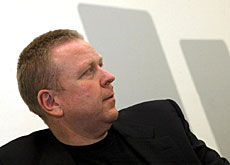
Heller issues wake-up call to sleepy Switzerland

The former director of the Swiss national exhibition, Expo.02, says Switzerland is slumbering in a bed of political stagnation and is badly in need of a wake-up call.
In an interview with swissinfo, Martin Heller insisted fundamental failings had been ignored in the run-up to next week’s cabinet elections.
Wednesday’s elections – in which Christoph Blocher of the rightwing Swiss People’s Party is gunning for a cabinet seat – have been the subject of much discussion and speculation.
Some fear a Blocher victory could upset the Swiss system of consensus politics, while others see it as a chance to shake up the old power-sharing structure.
However, Keller sees the election as simply a sideshow to more pressing problems concerning cultural differences, federalism, and Europe.
He says these need to be addressed if Switzerland is to progress.
swissinfo: Can the Swiss People’s Party move Switzerland forward if Blocher gets a seat in the cabinet?
Martin Heller: I think that’s out of the question. A party which tries to keep this country in a state of rigor mortis – and ultimately only wants to make progress in areas that are in its own interests – is not going to be able to push through what is really needed. It would need to promote initiative, drive and enthusiasm to make Switzerland a more inspired country than it is at present.
swissinfo: The political and media worlds find the current developments very exciting.
M.H.: I don’t agree. This whole fuss – at present about the cabinet elections – hides other, far more fundamental problems. Nobody is paying any attention to what really needs to be done.
swissinfo: In which areas should action be taken?
M.H.: I think Switzerland has become very divided over the last four years. Politics, culture, the economy are all setting their own agendas. There are very few people who are tapping the full potential of the country for the benefit of society. This is one huge area where something could be done.
I have noticed, especially after Expo.02, that the four largest cultures in Switzerland [German, French, Italian and Romansh-speaking] are drifting apart.
These are four cultures which have very different ideas about what would be good for the country and even themselves.
And then we have the huge political topic of federalism. I am totally convinced that Switzerland cannot afford to have a federal system anymore. It’s taking energy away from more important problems: narrow-mindedness and the fact that regional authorities tend to act in their own interests rather than considering the national picture.
swissinfo: Could reform help the political system?
M.H.: People always want reforms, but I don’t know how they could be carried out. It’s been clear to me for a long time, especially after being director of Expo.02, that politics has lost a lot of its meaning for ordinary Swiss people.
We don’t define ourselves through politics any more, and certainly not in terms of which political parties we support. The only people who have yet to realise this are the politicians themselves. We define ourselves a lot more through our hobbies and interests, and everyday life – through a lot of things that still make Switzerland an attractive place to live.
Today’s politics has become a spectacle, which is inappropriate.
swissinfo: The EU is growing in size and political weight, but it doesn’t look likely that Switzerland will be joining – with or without Blocher in the cabinet – in the near future. What could be the consequences for Switzerland?
M.H: If people want to go it alone, then they have to realise that an open, flexible society is an advantage when encouraging businesses into the country. But this has never been considered by the People’s Party or any of the other parties.
Another aspect is the fact that in other European countries, a definite European way of thinking is developing. The present generation in Switzerland is missing out on this. In this way, this myth of Switzerland as an island in the middle of Europe is almost self-destructive.
swissinfo: This doesn’t sound very optimistic. As a man of culture, do you have your own vision of how a new Switzerland should be?
M.H: During Expo.02, I found a very charming Switzerland which was open to change. But it needs more courage from individuals, from the media, from personalities, to start a debate to end this political deadlock.
There is so much potential to be an open, flexible society, and so much international know-how. But we seem to be deliberately hiding our light under a bushel.
swissinfo-interview: Jean-Michel Berthoud (translation: Isobel Leybold)
Born in 1952, Martin Heller is an art historian and ethnologist.
1989: director of the Museum of Design in Zurich
1997: director of the Bellerive Museum in the same city.
1995-97: visiting professor at Karlsruhe design school in Germany.
1999-2003: artistic director of Expo.02, the Swiss national exhibition.
May 2003: artistic director of the German city of Bremen’s bid to become a European city of culture in 2010.

In compliance with the JTI standards
More: SWI swissinfo.ch certified by the Journalism Trust Initiative


























You can find an overview of ongoing debates with our journalists here . Please join us!
If you want to start a conversation about a topic raised in this article or want to report factual errors, email us at english@swissinfo.ch.